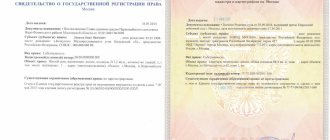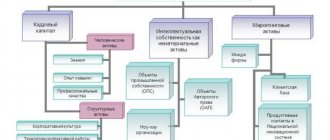Although the term “property rights” is mentioned in the articles of the Civil Code of the Russian Federation (Article 128 of the Civil Code of the Russian Federation), it is not disclosed in detail anywhere. For example, as the subject of obligatory relations, “property rights”, as rights of claim, are mentioned in Art. 572 of the Civil Code of the Russian Federation (donation agreement) and Art. 336 of the Civil Code of the Russian Federation (subject of pledge).
The Constitutional Court of the Russian Federation in Resolution No. 9-P dated 06.06.2000 explained that everyone has the right to own property, own, use and dispose of it both individually and jointly with other persons (Article 35 of the Constitution of the Russian Federation), everyone has the right to free use of one’s property for business and other activities (Article 34 of the Constitution of the Russian Federation).
The implementation of property rights is carried out on the basis of general legal principles of inviolability of property and freedom of contract, presupposing equality, autonomy of will and property independence of participants in civil law relations, and the inadmissibility of arbitrary interference by anyone in private affairs. The concept of “property” in its constitutional and legal sense covers, in particular, real rights and rights of claim belonging to creditors (Resolution of the Constitutional Court of the Russian Federation of May 16, 2000 No. 8-P).
Within the meaning of these provisions, the term “ property ” covers any property associated with the implementation of the right of private and other forms of ownership, including property rights, including the rights of ownership, use and disposal of property received from the owner.
The resolution of the Plenum of the Supreme Court of the Russian Federation dated July 9, 2013 N 24 “On judicial practice in cases of bribery and other corruption crimes” explains that property rights include the right to property, including the right to claim the creditor, as well as other rights that have a monetary value, for example, the exclusive right to the results of intellectual activity and means of individualization equivalent to them (Article 1225 of the Civil Code of the Russian Federation). Based on this, we can formulate a definition of property rights.
Property rights are the subjective rights of participants in civil legal relations related to the ownership, use and disposal of property, as well as material (property) claims arising in the course of civil transactions and having a monetary value.
Definition of the concept of “property law”
The current civil legislation does not provide a clear definition of what “ property law ” is. Provisions of Art. 128 of the Civil Code of the Russian Federation only indicate property rights as a type of property, without disclosing the specific features of the named object of civil rights. That is, from the norm of Art. 128 of the Civil Code of the Russian Federation it follows that property rights are part of property and are a type of object of civil rights.
In the legal literature, for example, the following definition of the concept of “property rights” is proposed:
Property rights are subjective rights of participants in property relations related to the ownership, use and disposal of property, as well as material (property) claims that arise between participants in civil transactions regarding the distribution of this property and exchange (goods, services, works, securities, money, etc.) (Tikhomirov M.Yu. Legal Encyclopedia. M., 1995. P. 78.).
The Constitutional Court of the Russian Federation clarified that the term “property” covers any property, including property rights, including the rights of ownership, use and disposal of property received from the owner (Resolution of the Constitutional Court of the Russian Federation dated 06.06.2000 N 9-P). The concept of “property” covers, in particular, real rights and rights of claim belonging to creditors (Resolution of the Constitutional Court of the Russian Federation of May 16, 2000 N 8-P).
Classification of civil contracts
A universal type of civil law transaction is an agreement. Essentially, this is a two-way transaction with emerging rights and obligations between the participants.
To navigate the variety of contracts, a classification is used based on characteristics that are unique to certain types of agreements:
- on the implementation of the counter proposal:
- compensated – receipt of benefits by all parties to the agreement after fulfillment of obligations;
- gratuitous - one party to the agreement receives benefits, the other party has no property interest.
- on the distribution of rights and obligations between the parties to the agreement:
- unilateral - one party receives rights, the other receives obligations;
- mutual - rights and obligations arise for each party to the agreement.
- by legal condition:
- the main ones are the dependence of the emergence of rights and obligations on the movement of property goods;
- preliminary - assume the conclusion of the main contract in the future.
- by method of conclusion:
- mutually agreed - agreement on the terms of the contract by the parties to the agreement;
- accession - the establishment of conditions by one party, with which the other party agrees or not.
- by right of requirement to fulfill duties:
- for the benefit of the participants;
- in favor of 3rd parties.
- based on the conclusion:
- free - concluded at the will of the parties to the contract;
- mandatory - concluded on the basis of a legislative act.
Inheritance law regulates the transfer of property rights from the testator to the heirs.
1.1. Property rights as a type of property rights
Property rights are a type of property rights that are classified as absolute rights. The object of property law is only an individually defined movable or immovable thing, i.e. a thing that has special properties inherent only to it.
The main property right is the right of ownership. The content of the right of ownership consists of three powers: the right of ownership, the right of use and the right to dispose of one’s property, which the owner has the right to transfer to other persons in various combinations of them, while remaining the owner (Clause 2 of Article 209 of the Civil Code of the Russian Federation). Such persons have fewer opportunities, therefore these rights are called rights to other people's things or limited property rights.
In accordance with paragraph 1 of Art. 216 of the Civil Code of the Russian Federation, real rights along with the right of ownership, in particular, are: the right of lifelong inheritable ownership of a land plot (Article 265); the right to permanent (indefinite) use of a land plot (Article 268); easements (Articles 274, 277); the right of economic management of property (Article 294) and the right of operational management of property (Article 296).
To protect property rights, special methods of protection are provided (clause 4 of Article 216, Articles 301, 304, 305 of the Civil Code of the Russian Federation): a vindication claim for the recovery of a thing from someone else’s illegal possession; negative claim to eliminate violations of law not related to deprivation of possession of a thing.
1.2. Rights of obligations as a type of property rights
The concept of the law of obligations follows from the norm of paragraph 1 of Art. 307 of the Civil Code of the Russian Federation, which defines the concept of obligation : by virtue of an obligation, one person (debtor) is obliged to perform a certain action in favor of another person (creditor), such as: transfer property, perform work, pay money, etc. or refrain from a certain action, and the creditor has the right to demand that the debtor fulfill his obligation.
Thus, rights of obligation allow the creditor to demand that the debtor perform a certain action or refrain from performing it. Such rights are also called claim rights . For example, under a purchase and sale agreement, the buyer has the right to demand that the seller perform an action - transfer the goods. If the seller violates an obligation, one can only demand to fulfill the obligation or compensate for losses (clause 2 of Article 463, Article 398 of the Civil Code of the Russian Federation). And in an agency agreement, it is possible to provide for the agent’s obligation not to perform an action - not to enter into similar agreements with other principals, executed in the same territory (Clause 2 of Article 1007 of the Civil Code of the Russian Federation).
Obligatory rights also include the right to use property transferred, for example, under a lease agreement.
Thus, the right of claim is a right of obligation, which, in turn, refers to property rights . It is in an obligation that one person must do something or refrain from a certain action, and another person has the right to demand the fulfillment of this obligation. Property rights are defined as the right of claim by the Constitutional Court of the Russian Federation in Resolution No. 14-P of October 28, 1999, which directly states that “property rights are rights of claim.”
Possibility of assignment of rights . In accordance with the procedure established by law, one subject can cede to another a right (claim) belonging to him or take on someone else’s obligation (Articles 382 - 392 of the Civil Code of the Russian Federation). In other words, rights of obligation, as a type of property rights, have independent economic value as objects of civil rights. They can be assigned, or, for example, pledged (Article 358.1 of the Civil Code of the Russian Federation).
Liabilities arising from causing harm and unjust enrichment . As a rule, rights of obligations arise from contracts and other transactions, but they can also arise between persons not related to each other by any contracts or agreements (clause 2 of Article 307 of the Civil Code of the Russian Federation). Thus, a person bears tort liability for causing harm (Article 1064 of the Civil Code of the Russian Federation), and unjust enrichment is subject to return according to the rules of Art. Art. 1102 – 1109 Civil Code of the Russian Federation.
The list of property rights is open and, due to freedom of contract, it is possible to provide for almost any right that does not contradict the law (clause 4 of Article 421 of the Civil Code of the Russian Federation).
Property rights include those expressly specified as such in Art. 128 of the Civil Code of the Russian Federation: non-cash funds, uncertificated securities, digital rights.
Why you should contact us
Guarantee. Several cooperation options for your convenience. You pay only for the result! The liability of each of our appraisers is insured under an insurance contract.
Efficiency. By calling our company, you get in direct contact with a specialist. You don’t need to explain your problem several times and listen to ringtones on your phone endlessly. At any stage of interaction with the company - from the first call to specialists to the assessment - the Customer can count on a quick and effective solution to their issues.
Convenience. It is you who choose the day and time of inspection of the property being assessed. You don't need to reschedule any business. We will arrive when it is convenient for you.
Quality. In our company, each conclusion - assessment report - before printing, undergoes a two-stage check for compliance with the standards of expert activity - checked by a leading expert and the head of the organization.
Reputation. Why take my word for it? Look at the reviews from our Clients. Maybe your partner is among them?
Professionalism. We employ certified specialists who are members of a self-regulatory organization and have a license.
Good practice. More than 300 won cases.
1.4. Exclusive rights as a type of property rights
Rights to the results of intellectual activity and means of individualization are called “intellectual rights” (Clause 1, Article 2 of the Civil Code of the Russian Federation).
Intellectual rights include three groups of rights:
- personal non-property rights are subjective civil rights that are inseparable from the personality of the author (creator, manufacturer) of the result of intellectual activity and do not have economic (property) content. These include, in particular, the right of authorship, the right to the copyright name, and the right to the integrity of the work. These rights arise at the moment of creation of an object of intellectual property and do not allow the possibility of their alienation (disposal); waiver of these rights is void (clause 2 of Article 1228 of the Civil Code of the Russian Federation);
- exclusive (property) rights are subjective civil rights that have economic value and allow transfer (transfer) from one person to another. Both individuals and legal entities, and in some cases, the state and its subjects, can become holders of exclusive rights. Often these rights initially arise from the author (co-authors), but they can be transferred (or transferred) to another person under an agreement or acquired, for example, as a result of inheritance or reorganization of a legal entity. At the same time, exclusive rights, unlike personal non-property rights, are protected only for the period established by law (Article 1230 of the Civil Code of the Russian Federation);
- accompanying rights are subjective civil rights that cannot be classified as either personal non-property or exclusive rights. Yes, Art. 1226 of the Civil Code of the Russian Federation recognizes the existence of other rights, which, in particular, include the right of access (Article 1292 of the Civil Code of the Russian Federation), the right of succession (Article 1293 of the Civil Code of the Russian Federation), the right to obtain a patent (Article 1357 of the Civil Code of the Russian Federation), etc. Related Most rights are transferable along with exclusive rights, and they are often protected for the same period as personal non-property rights.
Not all types of intellectual rights can be introduced into civil circulation, but only exclusive rights.
Exclusive rights as a type of property rights
In accordance with Art. 1226 of the Civil Code of the Russian Federation, intellectual rights include, inter alia, exclusive right , which is a property right .
Exclusive are the rights to intellectual property, that is, to the results of intellectual activity or equivalent means of individualization of legal entities (their goods, works, services, etc.).
Almost all exclusive rights have a validity period (Article 1230 of the Civil Code of the Russian Federation). For example, for inventions - 20 years, for utility models - 10 years, for industrial designs - 5 years (Clause 1 of Article 1363 of the Civil Code of the Russian Federation).
Exclusive rights are similar to real rights, however, unlike the latter, they arise on intangible objects (works, inventions, trademarks, etc.).
The results of intellectual activity and means of individualization equated to them (Article 1225 of the Civil Code of the Russian Federation) cannot be alienated or otherwise transferred from one person to another.
Clause 4 art. 129 of the Civil Code of the Russian Federation provides that it is not the results of intellectual activity and means of individualization themselves that can be alienated and otherwise transferred from one person to another, but, firstly, the rights to such results and means (intellectual property) and, secondly, material media , in which the corresponding results and means are expressed.
The fact is that, as a general rule, in order to obtain legal protection, intellectual property objects must be objectified, i.e. must be embodied in a material object (i.e., a material carrier). Thus, a literary work is objectified in the form of a manuscript, a computer program is recorded on a disk or flash drive, the invention is reflected in drawings, etc.
This kind of material objects (manuscript, disk drive, drawings and specifications) can be objects of property and liability rights . Consequently, legal relations arising in relation to a material object in which an object of intellectual property is embodied are relations in relation to a thing (property), which are regulated by the rules of property or obligation law.
As part of the exclusive right, two independent subjective rights can be distinguished - the right to use and the right to dispose of the exclusive right . The right to use is aimed at implementing the powers that constitute an exclusive right, while the right to dispose of an exclusive right ensures the introduction of this right into civil circulation.
The right to use the result of intellectual activity
The basis of the content of the exclusive right is that the copyright holder can use the result of intellectual activity or a means of individualization at his own discretion in any way that does not contradict the law (paragraph 1, paragraph 1, article 1229 of the Civil Code of the Russian Federation).
Thus, an exclusive right is the right to use the result of intellectual activity or a means of individualization. The content of an exclusive right includes methods of using the result of intellectual activity or a means of individualization. Specific methods of use, the list of which, as a rule, is not exhaustive, are determined by the following articles of the Civil Code of the Russian Federation:
Art. 1270 of the Civil Code of the Russian Federation (in relation to works of science, literature and art); Art. 1317 of the Civil Code of the Russian Federation (regarding executions); Art. 1324 of the Civil Code of the Russian Federation (in relation to phonograms); Art. 1330 of the Civil Code of the Russian Federation (in relation to messages from radio and television programs); Art. 1334 of the Civil Code of the Russian Federation (regarding the content of databases); Art. 1339 of the Civil Code of the Russian Federation (in relation to works as objects of publisher’s rights); Art. 1358 of the Civil Code of the Russian Federation (in relation to inventions, utility models and industrial designs); Art. 1421 of the Civil Code of the Russian Federation (in relation to selection achievements) Art. 1454 of the Civil Code of the Russian Federation (in relation to topologies of integrated circuits); Art. 1466 of the Civil Code of the Russian Federation (regarding trade secrets); Art. 1474 of the Civil Code of the Russian Federation (in relation to brand names); Art. 1484 of the Civil Code of the Russian Federation (in relation to trademarks and service marks); Art. 1519 of the Civil Code of the Russian Federation (regarding appellations of origin of goods); Art. 1539 of the Civil Code of the Russian Federation (regarding commercial designations).
The right to dispose of the result of intellectual activity
The exclusive right of the copyright holder also includes the right to dispose , including the right to alienate, the right to transfer rights of use, the right to permit or prohibit other persons from using the result of intellectual activity (Articles 1229, 1233 of the Civil Code of the Russian Federation).
Taking into account the property nature of the exclusive right, the legislator has provided for the possibility of disposing of this right through its full (for example, transfer under an agreement on the alienation of an exclusive right) or partial (granting the right to use an object within specified limits under a license agreement) transfer to other persons. However, the degree of negotiability of an exclusive right depends on the object to which the exclusive right is transferred. So, for example, the exclusive right to a company name by virtue of clause 2 of Art. 1474 of the Civil Code of the Russian Federation is non-negotiable and disposal is not allowed. The same applies to the exclusive right to the appellation of origin of goods (clause 4 of Article 1519 of the Civil Code of the Russian Federation). a commercial designation is significantly limited (clauses 4 and 5 of Article 1539 of the Civil Code of the Russian Federation).
1.5. Corporate rights as a type of property rights
Corporate rights are a collective category that unites property and non-property organizational relations.
Most modern scientists do not classify corporate rights of participants in commercial organizations as obligatory rights and do not see a proprietary nature in these relations, recognizing the special nature of corporate rights.
Corporate rights are distinguished by the presence in them of a managerial (organizational) element, which is atypical for civil law regulation. These rights arise on the basis of special legal facts (participation in the constituent agreement, joining a cooperative, acquisition of ownership of a share, shares, etc.), express the relationship between the founders and the legal entity, and are associated with the indirect right to the property of the legal entity when it liquidation, etc.
Corporate rights are subjective rights of a special nature, different from real and obligatory rights, representing a set of non-property (organizational-managerial) and property rights of a participant arising from participation in a corporate organization.
The list of corporate rights is contained in Art. 65.2 of the Civil Code of the Russian Federation in relation to all types of corporations and is specified in relation to business partnerships and companies in Art. 67 Civil Code of the Russian Federation. Also, corporate rights can be specified in the constituent document, special laws (for example, the Law on JSC, the Law on LLC).
Property corporate rights are the following rights (Clause 1, Article 67 of the Civil Code of the Russian Federation):
- the right to participate in the distribution of the company's profits , which includes: 1) participation in the adoption by the general meeting of shareholders (participants) of a decision on the distribution of profits received by the company based on the results of activities for a certain period; 2) receiving part of the company’s net profit attributable to the share (participation interest) owned by the shareholder (participant);
- rights related to receiving part of the company's property in the event of its liquidation , including, in particular, the following regulatory provisions: 1) a participant in a business company has the right to receive part of the company's property in the event of its liquidation - the right to a liquidation quota; property is distributed after settlements with creditors have been made (Article 67 of the Civil Code of the Russian Federation); 2) the size of the liquidation quota is determined on the basis of data from the liquidation balance sheet compiled by the liquidation commission and approved by the general meeting of participants of the business company (clauses 6, 8 of Article 63 of the Civil Code of the Russian Federation); 3) all owners of shares (members of the LLC) have the right to receive part of the property of the liquidated company; 4) the demands of shareholders (participants) are satisfied in the order strictly defined by law (Article 23 of the Law on JSC; Article 58 of the Law on LLC).
Not all corporate rights are directly related to the property of the company. Along with property rights of obligations, the participant also has (organizational and managerial) rights These, for example, include the following rights (Article 65.2 of the Civil Code of the Russian Federation, Article 8 of the Law on LLC):
- the right to participate in managing the affairs of the company , which includes, for example, the following: 1) participation in preparations for the general meeting of shareholders (participants), including the inclusion of issues on the agenda of the meeting, nomination of candidates to management bodies and other economic bodies companies (Article 53 of the Law on JSC; Article 36 of the Law on LLC); 2) participation in the general meeting of shareholders (participants) of a business company - personally or through a representative (Articles 51, 57 of the Law on JSC; Article 37 of the Law on LLC); 3) voting on issues on the agenda of the general meeting of shareholders (participants) (Articles 31, 32, 49, 59 - 61 of the Law on JSC; Article 32 of the Law on LLC);
- the right to receive information about the activities of the company is exercised through: 1) access of the participant to the accounting (financial) and other documentation of the company (paragraph 3, paragraph 1, article 65.2 of the Civil Code of the Russian Federation, article 91 of the Law on JSC; article 50 of the Law on LLC) ; 2) bringing to the attention of participants information related to the convening and holding of general meetings of shareholders and general meetings of participants (Articles 52, 92 of the Law on JSC; Article 36 of the Law on LLC).
Differences between property and non-property rights
The object of property relations is property, for example, things or property rights (Article 128 of the Civil Code of the Russian Federation). Property relations concern the ownership or transfer of these goods. The most important property rights are obligatory, proprietary, exclusive and corporate. Most property rights can be transferred to another person.
The object of non-property relations is intangible benefits: human life and health, business reputation, the author’s right to a name, etc. (clause 1 of article 150 of the Civil Code of the Russian Federation). Moral rights include , for example, the right to life, dignity, and one’s own image. Personal non-property rights are inalienable. Intangible benefits that belong to a citizen from birth or by force of law cannot be alienated or transferred in any other way (Clause 1 of Article 150 of the Civil Code of the Russian Federation).
Forms of ownership in the Russian Federation
- Private property of an individual is a form of ownership in which funds and property belong to individuals.
- Private property of a legal entity is a form of ownership in which property belongs to legal entities.
- State property of the Russian Federation or its subjects is a form of ownership in which property belongs to the entire society, the state as a whole.
- Municipal property is property owned by urban and rural settlements, as well as other municipalities.









